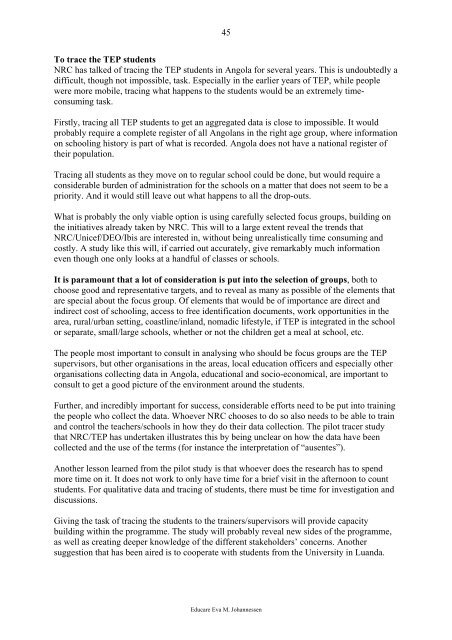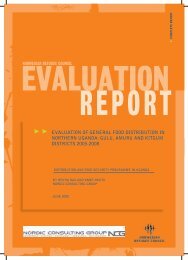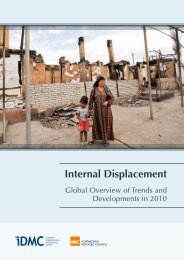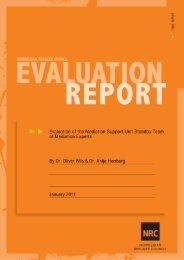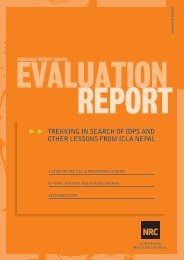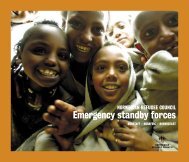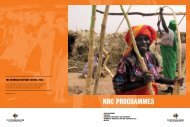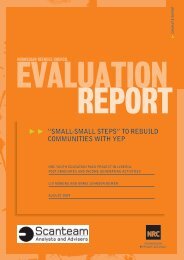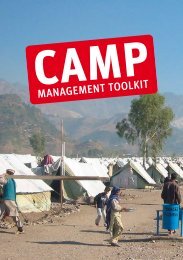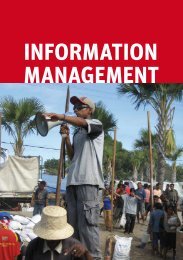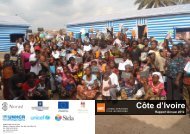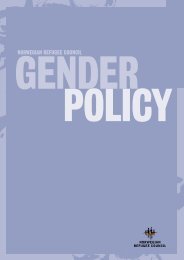ONE STEP CLOSER - BUT HOW FAR? - Norwegian Refugee Council
ONE STEP CLOSER - BUT HOW FAR? - Norwegian Refugee Council
ONE STEP CLOSER - BUT HOW FAR? - Norwegian Refugee Council
- No tags were found...
Create successful ePaper yourself
Turn your PDF publications into a flip-book with our unique Google optimized e-Paper software.
45To trace the TEP studentsNRC has talked of tracing the TEP students in Angola for several years. This is undoubtedly adifficult, though not impossible, task. Especially in the earlier years of TEP, while peoplewere more mobile, tracing what happens to the students would be an extremely timeconsumingtask.Firstly, tracing all TEP students to get an aggregated data is close to impossible. It wouldprobably require a complete register of all Angolans in the right age group, where informationon schooling history is part of what is recorded. Angola does not have a national register oftheir population.Tracing all students as they move on to regular school could be done, but would require aconsiderable burden of administration for the schools on a matter that does not seem to be apriority. And it would still leave out what happens to all the drop-outs.What is probably the only viable option is using carefully selected focus groups, building onthe initiatives already taken by NRC. This will to a large extent reveal the trends thatNRC/Unicef/DEO/Ibis are interested in, without being unrealistically time consuming andcostly. A study like this will, if carried out accurately, give remarkably much informationeven though one only looks at a handful of classes or schools.It is paramount that a lot of consideration is put into the selection of groups, both tochoose good and representative targets, and to reveal as many as possible of the elements thatare special about the focus group. Of elements that would be of importance are direct andindirect cost of schooling, access to free identification documents, work opportunities in thearea, rural/urban setting, coastline/inland, nomadic lifestyle, if TEP is integrated in the schoolor separate, small/large schools, whether or not the children get a meal at school, etc.The people most important to consult in analysing who should be focus groups are the TEPsupervisors, but other organisations in the areas, local education officers and especially otherorganisations collecting data in Angola, educational and socio-economical, are important toconsult to get a good picture of the environment around the students.Further, and incredibly important for success, considerable efforts need to be put into trainingthe people who collect the data. Whoever NRC chooses to do so also needs to be able to trainand control the teachers/schools in how they do their data collection. The pilot tracer studythat NRC/TEP has undertaken illustrates this by being unclear on how the data have beencollected and the use of the terms (for instance the interpretation of “ausentes”).Another lesson learned from the pilot study is that whoever does the research has to spendmore time on it. It does not work to only have time for a brief visit in the afternoon to countstudents. For qualitative data and tracing of students, there must be time for investigation anddiscussions.Giving the task of tracing the students to the trainers/supervisors will provide capacitybuilding within the programme. The study will probably reveal new sides of the programme,as well as creating deeper knowledge of the different stakeholders’ concerns. Anothersuggestion that has been aired is to cooperate with students from the University in Luanda.Educare Eva M. Johannessen


